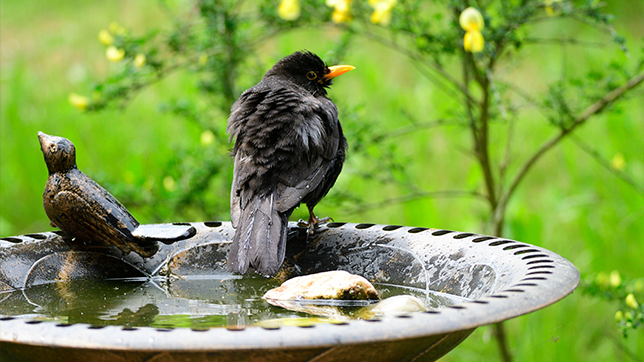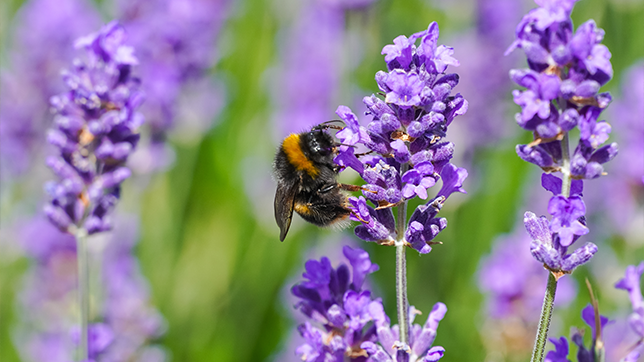19th April 2024
The warmth we’ve been waiting for, that’s carried us through the wet winter weather, has finally arrived – and we’re more than ready to enjoy the summer sunshine!
However, as much as we welcome the blazing summer sun, hot weather and heatwaves can be harmful to wildlife. So, as part of our Tails of UK Wildlife campaign, we’ve assembled a few top tips to help you support the wildlife surrounding your home…
How to provide wildlife with fresh water
One of the major issues facing many species during dry, humid conditions is finding enough water. Whether or not you have a garden, there’s something you can do to help – here are some options:
- Use a shallow dish: Place a shallow dish of fresh drinking water on a windowsill to allow birds and insects to stay hydrated. Make sure it contains a few pebbles just in case bees or butterflies need to climb out. This dish could also be placed in any outside space, for ground-dwelling wildlife species, like hedgehogs, to drink from.
- Make a birdbath: You could buy or make a birdbath to ensure that wild birds have constant access to water for drinking, as well as bathing to keep themselves cool.
- Add a small pond: This could attract amphibians, like frogs, while also providing drinking water for other wildlife. Don’t forget, the pond must be kept safe for pets and children.
- Utilise a water feature: Put a water feature in your garden that offers running water for wildlife of all shapes and sizes.
Top tip: Choose shaded areas for your water sources, to protect wildlife from the sun’s heat while they’re having a drink or taking a dip.
It’s vital to clean out any water sources daily, and to keep them topped up with fresh water so there’s always plenty available – wildlife will thank you!

Create shaded spaces
For species who rely on a cool environment to avoid dehydration, e.g. amphibians, having access to a shady spot in the garden is crucial to their survival during summertime.
It’s also important to put any birdbaths under the shaded protection of trees, hedges or walls, to lower the risk of birds being taken by predators while they’re drinking or bathing.
Creating shady spaces for wildlife could involve:
- Letting a small section of your lawn grow wild, which will allow tall grasses and plants to provide protection from the sun for cold-blooded species, like newts.
- Adding some shrubs and/or trees to your garden or in patio pots, then placing food and water in the shade they help create, so wildlife won’t have to eat or drink under scorching sunshine.
- Selecting a spot in an unloved corner of your garden and mimicking the woodland floor, by building a pile of logs to provide shade for insects and small mammals.
Offer wildlife-friendly food
Food is a year-round essential for all wildlife. So, it’s amazing how a seemingly small gesture, like offering them something to eat, can have a hugely positive impact on the welfare of wildlife around you!
But what types of food are best for each species of wildlife? Visit our article about pet-safe food to feed UK wildlife to find out!
Grow pollinator-friendly flowers and plants
Whether you have one plant pot or a large garden plot, adding pollinator-friendly flowers to your outside space is a great way to give back to nature this summer, while adding a splash of colour too!
There are many different types of pollinators, including bees, butterflies, moths, beetles, hoverflies, and wasps. Although insects like wasps aren’t anyone’s first choice of pollinator to attract to their garden, each species plays a vital role in biodiversity and they’re all worthy of our respect.

Thankfully, there’s an enormous choice of plants and flowers that’ll invite pollinators to any outdoor space – we can’t list them all, so, our top choices include:
- Lavender.
- Hawthorn.
- Honeysuckle.
- Wild strawberry.
- Catmint.
- Heather.
- Roses.
- Sunflowers.
- Snapdragon.
- Michaelmas daisies.
Avoid planting any flowers that might be poisonous to pets.
Use less outdoor lighting
Unless you’re outside under the glow of artificial lights while soaking up the last of the day’s rays, it’s helpful to wildlife if artificial lighting is kept to a minimum. There are some species, like moths and bats, who are attracted to bright lights – which means illuminating your garden could confuse them and affect their ability to find food.
Lights with motion sensors, light caps, or softer bulbs can ease disruption caused to wildlife by bright artificial lighting while still addressing any security concerns you may have.
How will you nurture nature in your neighbourhood? Tell us all about your wildlife encounters on Facebook or Instagram!
Animal welfare blog
If you found this blog useful, why not visit our animal welfare blog to find more articles about animal at risk around the world?
From news and facts, to charities helping protect animals and the great work they do - find out more about animal welfare and those making a difference.
Charities we support
Every year we donate hundreds of thousands of pounds to charities - find out more about the charities we support.
We know pets
Our pets are part of the family. To achieve our vision of a better future for pets everywhere, we work with our partners, vets, and other veterinary professionals who are pioneering the latest advancements in animal care. Our campaigns, articles, and events are crafted to support, educate, and celebrate pet owners, while our policies are designed to provide peace of mind at an affordable price.
Yet our policies don’t just protect against the unexpected – they have purpose, too.
Since we were founded over 25 years ago, we've provided industry-leading policies that protect the nation’s pets, while also making a difference to animal welfare and our planet. Thanks to you, our policyholders, we've donated over £9 million to more than 830 animal welfare charities and conservancies, helping to support vulnerable pets and wildlife around the world.
We’re proud to be wildly different. Are you?
